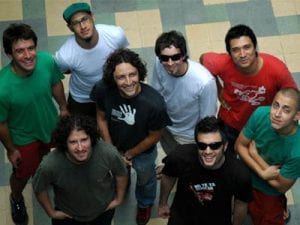The journalist from Clarín Pedro Irigoyen I travel to Montevideo (Uruguay) as special envoy to dialogue with You will not like it, one of the Uruguayan rock bands with the greatest future in that country.
Next to the La Vela Puerca, No Te Va a Gustar are consolidated in Argentina, where in the last year they have managed to reach radio stations across the country and are emerging as one of the public's favorite bands. Before the shows that they will give in moonpark, the Argentine newspaper spoke with them about their immediate projects, musical independence, the Montevideo-Buenos Aires relationship and, of course, about the brand new album, El camino más largo., who come to present on April 24 and 25 in Buenos Aires.
The large Montevideo band is made up of Brancciari (guitar and voice), Gonzalo Castex (percussion), Martín Gil (trumpet), Denis Ramos (trombone), Mauricio Ortiz (sax), Marcel Curuchet (keyboards), Guzmán Silveira (bass) and Diego Bartaburu (drums) .
Then the full interview:
What are the strengths and weaknesses of long roads? And the shorts?
The virtue of the long way, first of all, is to be able to live that way. That is the best thing about every situation in life that ends up being a journey: enjoying the journey itself more than the destination. The downside of the long road is that if you're in a hurry, you probably won't enjoy it. By the short way you arrive in less time, but you do not enjoy the route. And there is a difference between taking shortcuts and going where you think you have to go, and going through the stages that you have to burn to get to something. Maybe you get to the same place, but the long way the satisfaction is greater. What it costs is valued more. Suddenly, to take shortcuts, you have to give things up.
Does this have to do with independence?
Well, we are an independent band, we choose to release our own records. There are the shortcuts: you can sign with a multinational, it happened to us at some point and luckily we were able to get out. It is not that it is against, it simply does not serve us. We are in no rush. We enjoy doing things little by little, lunging, but having full control over what we do.
In this sense, how do you see the generation you sing to?
And is it a generation that is quiet. The rebellion is seen on the other side. On the one hand that does not build. Individualism is what prevails. Young people are taught that they have to step on the head of the next person and come up with certain things: 'Shit on the one next door and don't do anything in a group because it doesn't work'. I think we as a band were always the opposite.
You are Argentine, you came to live in Montevideo when you were 12 years old, what do you value most about being here and what do you miss about Buenos Aires?
I miss my father, friends, going to the field to see Boca ... Rescued from living in Uruguay the tranquility. Being able to get from one side to the other in 10 minutes. Obviously there are my family and my friends. I found my vocation here. I have a huge affection for Montevideo, it is a beautiful city. I love Buenos Aires, but the first traffic problem that catches you in a taxi, you want to go back. As a band they did not consider living there, we know that that would be precisely a shortcut.
The paparazzi stole photos of you, you made a song criticizing the media ...
To some media. They took a picture of me at the door for a gossip magazine. That was not very common here, what happened in Argentina was always consumed. But since there is no glamorous show business here, they came to break my balls. We left a rehearsal and I saw a guy in front with a huge lens. I went inside but they had already taken two photos of me. It was the cover of this magazine and I got mad a lot, but there was nothing I could do. A stolen photo, no argument, no note. The song speaks of the misused power of the media. You don't have to believe everything, basically. It is a power that we give when we decide to turn on the TV or buy these magazines. You have every right, but if you keep doing it, you keep giving power to certain things. Nobody forces you to see that Moria Casán got into a fight with I don't know who.
Did you get a lot of criticism for the new sounds they use on the album?
Change what has to change. It is logical. There are a lot of people who tell you: 'I liked the first albums'. I believe that if we did not change, we would be a sham. If I kept writing the same things and sounding the same as I was at 17, it wouldn't be authentic. After fifteen years you are not the same person. The problems are not the same. At that time I was worried about knowing if I was going to have a little money to go out for the weekend or if Boca would lose. It is impossible to offer the same. There are many people who liked the new, and it is perfect that there are many other people who do not like it. Life is like that, dynamic. Obviously, there are principles that remain: the way of being and relating to the band and the way of experiencing music.
Source: Clarín
